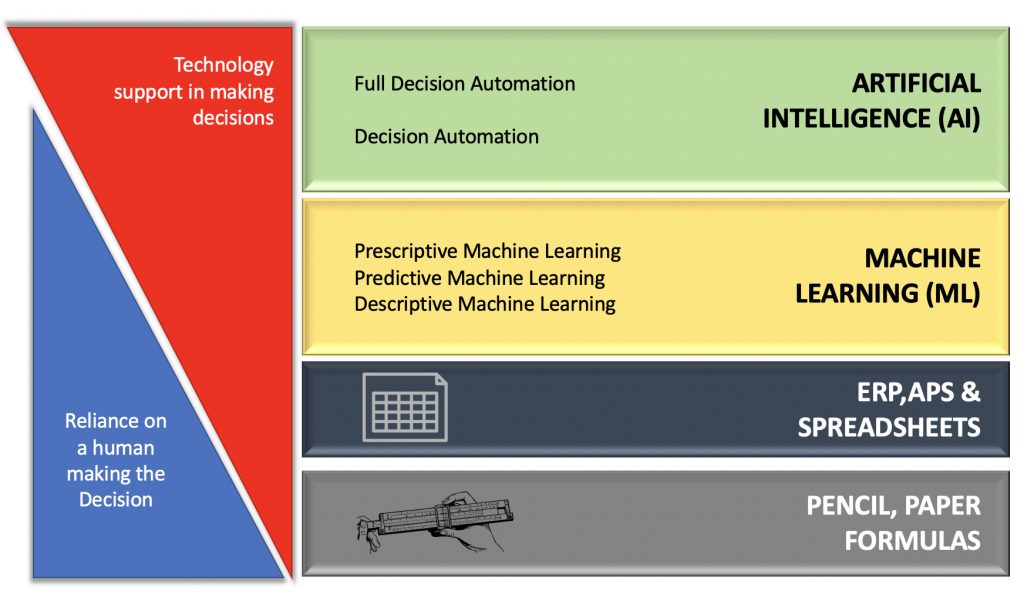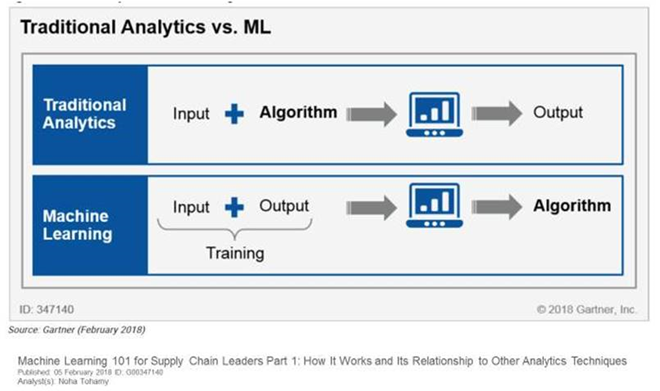by Greg West, Farthing West Chief Brilliance Officer

Machine Learning and Artificial Intelligence (AI) are terms that are increasingly being used in business and in the mainstream media.
But how much do you really know about these concepts?
More importantly, do you know how they are being applied across supply chains to provide a global competitive edge?
In this blog I will give an overview of the concepts and provide practical examples of how Global 2000 companies are applying this emerging technology.
“Machine learning is the science of getting computers to act without being explicitly programmed.” (Stanford) And, “… is based on algorithms that can learn from data without relying on rules-based programming.” (McKinsey & Co.)

For the past 30 years traditional ERP systems and Excel have helped business make better decisions. Data is crunched and analysed by humans that then leads to action. Machine Learning now provides a step change in decision making. But not all machine learning algorithms are the same.
Descriptive and Prescriptive Machine Learning
At its most basic level, descriptive Machine Learning algorithms assist businesses to understand what is actually happening. And, as the algorithms get smarter, they can inform you about the likely outcome. These descriptive and predictive forms of Machine Learning take the drudgery out of data analysis and enable humans to make better and faster informed decisions.
E2open use these algorithms extensively in our “Collaboration” suite of applications where we match forecasts to supplier’s offerings, match orders to shipped goods and invoices.
Just automating these simple tasks can remove 70% of the manual effort and by extension their costs. In addition, these basic forms of Machine Learning provide valuable and timely alerts and a prediction of the likely impact. This significantly improves customer service, lowers costs and grows sales. Not a bad outcome from basic level Machine Learning algorithms.
Machine Learning for Decision Support
Moving up the ladder of sophistication are the prescriptive Machine Learning applications that provide decision support. These Machine Learning applications help humans to decide what is the best course of action.
We at E2open use the prescriptive Machine Learning algorithms in our Demand & Supply Planning and Order Promising suite of products. We run sophisticated and automated what-if scenarios to provide solution recommendations. The result are insights on how to best satisfy supply constraints and still meet commitments. This approach gives a significant lift in “on time in full” (DIFOT) delivery and by extension service provision and market share capture while using less stock.
These powerful Machine Learning algorithms still relying on humans to make the final decision. In this regards, they do not qualify for the depiction as AI (Artificial Intelligence).
Decision Automation – The Emergence of AI
Decision automation applications qualify to be called AI applications. These are the self-learning, automated applications. This is the new frontier for supply chains.
Underpinning the architecture of E2open’s data input are our AI scoring algorithms, along with automation and supervised machine learning algorithms. This structure reviews the data from over 2.5 million companies that are on E2open’s E2net, sifting through millions of transactions per day to identify and clean poor data. Better data, better decisions.
Full Decision Automation
This is the powerful, sophisticated end of AI. These self-learning models automatically adjust to market realities. They are not just creating recommendations, they are automatically executing them without human review. This is the power of AI.
Full decision automation is a key part of E2open’s demand sensing, demand planning and multi-tier inventory optimisation offerings. For example:
- E2open’s supervised machine learning, using pattern recognition, improves near-term demand predictions by 30-40%;
- E2open’s unsupervised machine learning intelligently clusters similar items to gain a step-change in forecast accuracy for new products introductions.
Learn More
E2open are pioneers in artificial intelligence and machine learning, with more than a decade of large-scale field-tested solutions with Global 2000 companies, including Procter & Gamble, Pepsico, Exxon Mobil, Campbells and many others.
If you would like to learn more about how Machine Learning and Artificial Intelligence are being used to improve supply chains, you can contact me at Greg.West@farwest.com.au. I love sharing ideas on how to improve supply chains.